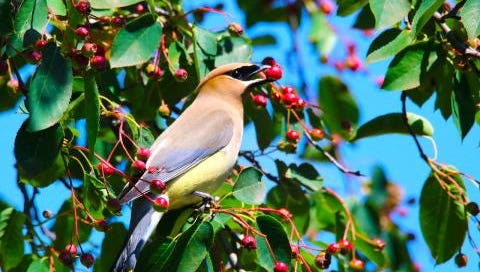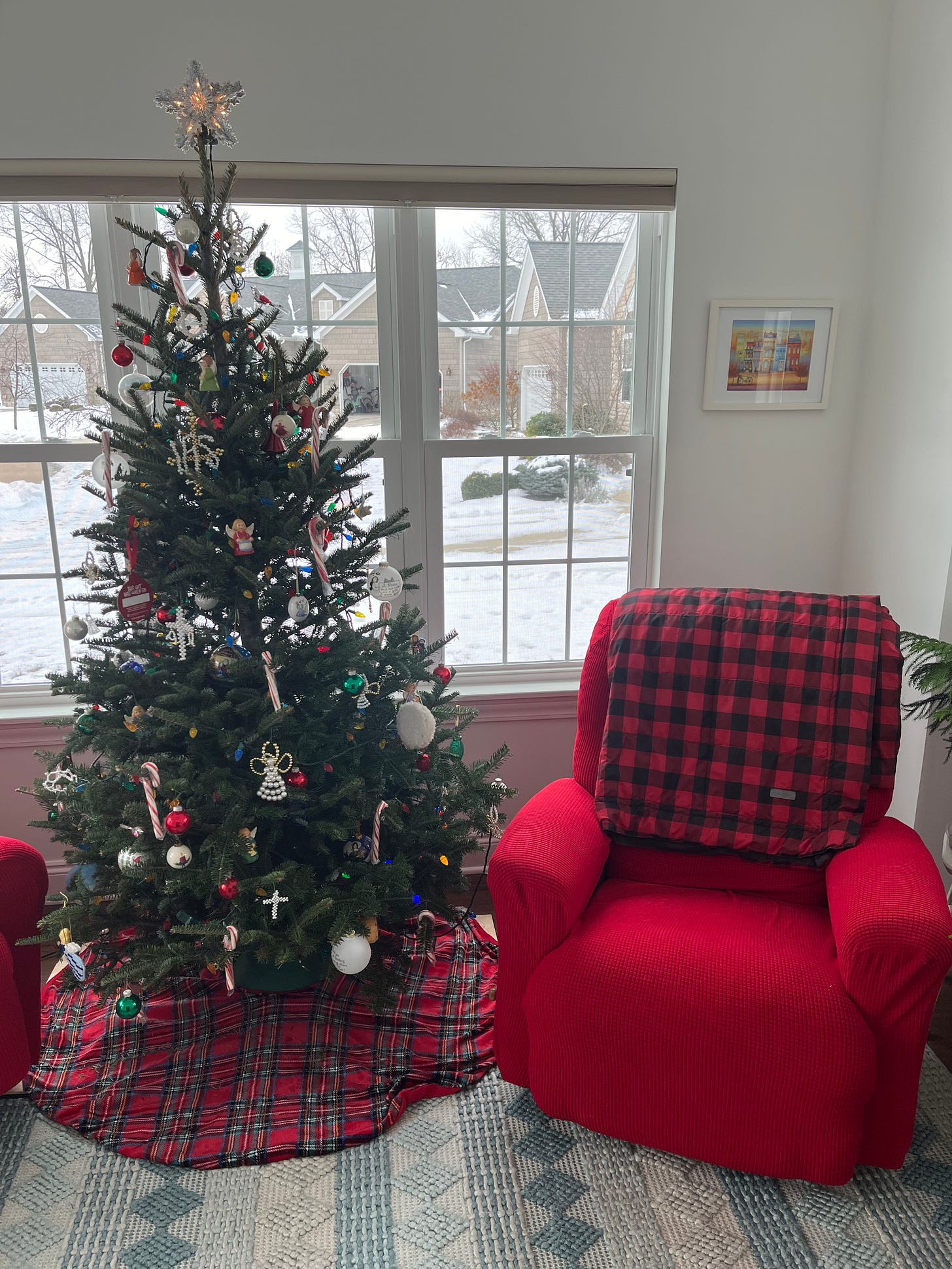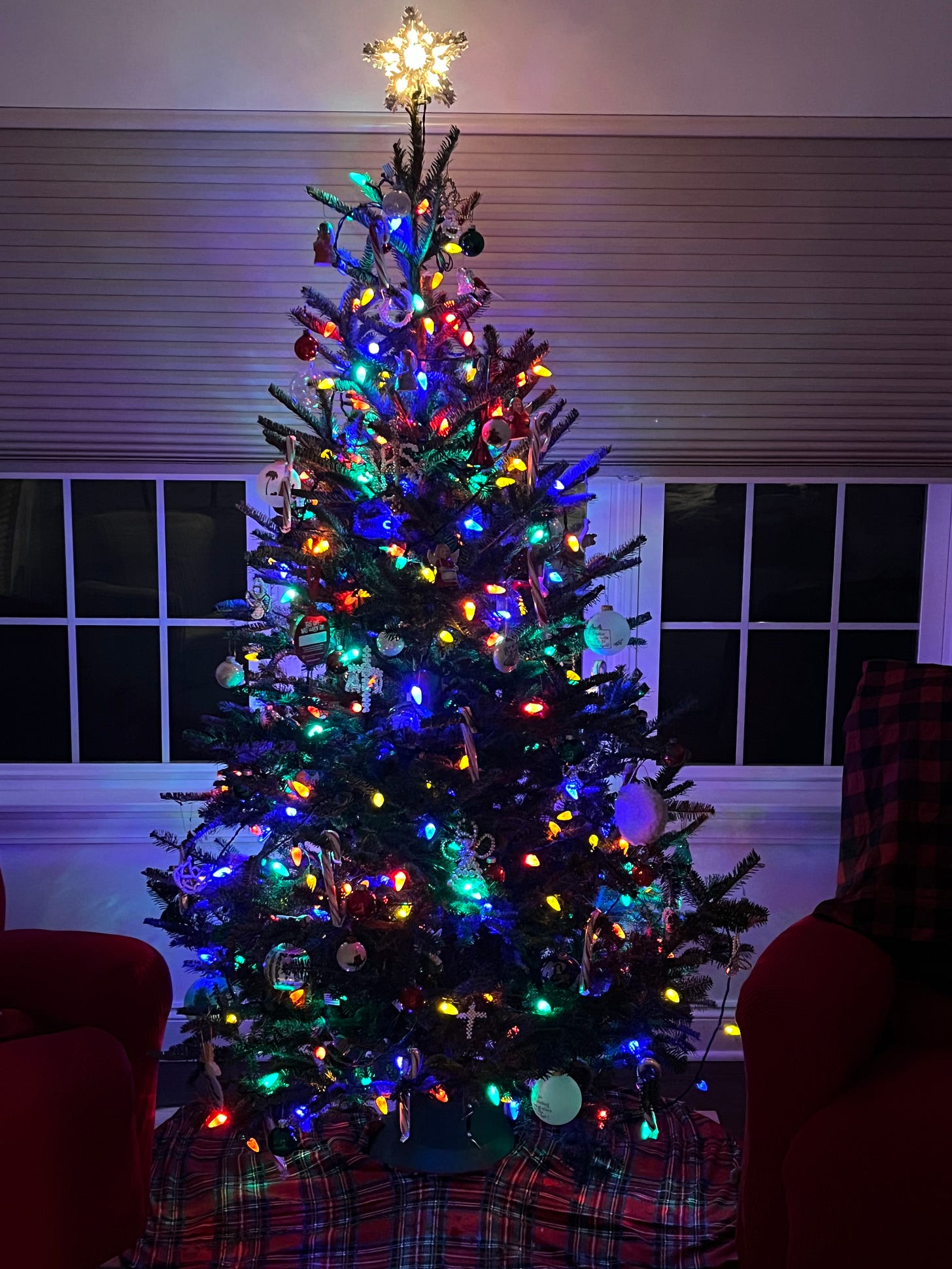The Serviceberry: Abundance and Reciprocity in the Natural World - A Book Review
"All flourishing is mutual." - Robin Wall Kimmerer, The Serviceberry
Throughout November 2023, I wrote a series of blog posts related to the subject of “oneness.” That series generated a lot of conversation and it seemed to resonate with many of my subscribers. Two of those posts - November 14 and 15, oneness with Creation - were based on the book Braiding Sweetgrass: Indigenous Wisdom, Scientific Knowledge, and the Teachings of Plants, by Robin Wall Kimmerer. The book was on the New York Times best seller list in 2014. Dr. Kimmerer is an Indigenous person, a PhD botanist, storyteller, poet, and gifted writer.
Last fall, she published a new book, The Serviceberry: Abundance and Reciprocity in the Natural World. I was (seemingly!) a good boy in 2024 and Santa put the book under the Christmas tree for me! I have read the book twice (it is rather short) already and it will be the crux of my sermon this Sunday. This blog post is a preview of my sermon, but I’ll save the best stories for this Sunday!
The Serviceberry, known by many other names including Juneberry, is a small berry, like a blueberry or cranberry that grows on trees. Dr. Kimmerer describes it as “a Blueberry crossed with the satisfying heft of an Apple, a touch of rosewater, and a miniscule crunch of almond-flavored seeds.” I don’t think that I have ever eaten one, so I’ll take her word for the taste.
Dr. Kimmerer’s neighbors planted a grove of Serviceberry trees and they produced in abundance. Herein lies the crux of the book; the difference between a gift economy and a market economy. In the Indigenous worldview, everything that makes life possible comes from the Earth. Early in the book, she observes, “When we speak of these not as things or natural resources or commodities, but as gifts, our whole relationship to the natural world changes….Receiving a gift from the land is coupled to attached responsibilities of sharing, respect, reciprocity, and gratitude - of which you will be reminded. This kind of gratitude is so much more than a polite ‘thank you.’ Not an automatic ritual of ‘manners,’ but a recognition of indebtedness that can stop you in your tracks - it brings you the realization that your life is nurtured from the body of Mother Earth.”
When I read this, I was immediately hooked on the book! My last sermon at Lutheran Church of the Resurrection was on the subject of gratitude. I said that God’s grace (gift) comes first, and our gratitude is a faithful response. Dr. Kimmerer, from the vantage point of nature (Creation) makes the same point. She offers a humbling thought for arrogant and egotistical humans; we can learn about gifts and gratitude from Creation! “The practice of observing the living world and taking inspiration for human ways of living from its model is an essential element of Indigenous science. It embraces the reality that there are intelligences other an our own, from whom we might learn. This ancient mode of knowledge making finds expression today in the emerging science of biomimicry.”
Biomimicry. Are you familiar with that word? I wasn’t. In fact, Dr. Kimmerer offers a whole new vocabulary that we might imagine as an alternative to a market economy. What are the attributes of a gift economy? Consider the vocabulary: It all comes from the Earth; Sharing, respect, reciprocity, and gratitude; Enoughness; Ecopsychology; Abundance; Ecological economics; Relationship; Interdependence; Community; We; Imagination; Restraint; Reverence; Symbiosis; Coevolution; Mutualism; Synchronicity; Social capital; Intentional communities of mutual self-reliance and reciprocity; Cooperation; and Circulation.
A market economy (yes, capitalism, for example!) commodifies products, encourages accumulation, rewards the individual, and results in scarcity. A gift economy encourages sharing, reciprocity, a sense of community, and results in abundance. Dr. Kimmerer comments, “I cherish the notion of the gift economy, that we might back away from the grinding system, which reduces everything to a commodity and leaves most of us bereft of what we really want: a sense of belonging and relationship and purpose and beauty, which can never be commoditized….I want to live in a society where the currency of exchange is gratitude and the infinitely renewable resource of kindness, which multiplies every time it is shared rather than depreciating with use.”
You might wonder, what does a gift economy look like? Is it practical? Consider TikTok, YouTube, The Little Free Library, Wikipedia, a dinner invitation, passing on a used stroller…and sharing an abundant harvest of Serviceberries with friends and neighbors! No, a gift economy will not replace a market economy, but it can certainly stand alongside it, and be of particular benefit in small communities. It surely resembles a Christian notion of stewardship and generosity. Think Acts 2 and 4, “they shared all in common and no one had any needs”…until Ananias and Sapphira broke the cycle out of fear and a sense of scarcity.
I have suggested to my neighborhood book club and I will suggest to Trinity Lutheran Church in my sermon this Sunday, that we give this a try: All read the book. Get together for wine and cheese. Put up the flipcharts, and brainstorm about how we could become gift economies. Perhaps you might consider this in some of the small communities that you belong to!
I confess that The Serviceberry did induce some guilt and I did feel indicted for my own lifestyle and shortcomings. Even Dr. Kimmerer admits complicity. We might reflect on her critique:
Why have we permitted the dominance of economic systems that commoditize everything? That create scarcity instead of abundance, that promote accumulation rather than sharing? We’ve surrendered our values to an economic system that actively harms what we love.
Let’s remember that the “System” is led by individuals, by a relatively small number of people, who have names, with more money than God and certainly less compassion.
I cringe when I hear economic reports celebrating the accelerating pace of economic growth, as if that were a good thing. It might be good for (the wealthy), for the short term, but it is a dead end for others - it is an engine of extinction.
This is surely a conundrum for me; not a new realization, but amplified. The growth of my retirement investment portfolio is continent on a higher GDP, which is based on increased consumption of Creation’s gifts that are not inexhaustible or unlimited! Do I hear an “Amen” from any of you?…
Dr. Kimmerer offers some questions for our serious reflection and action:
Climate catastrophe and biodiversity loss are the consequences of unrestrained taking by humans. Might cultivation of gratitude be part of the solution?
Regarding the commodification of water, she asks:
How long has it been since you drank wild water?
Can we imagine a system which nurtures a different economic identity and reclaim ourselves as neighbors, with shared investment in mutual well-being?
If the economy requires people to consume more resources than the Earth can replenish, just to keep the whole thing from collapsing, isn’t it time for a new economy?
These are MACRO questions! My philosophy/theology when we are facing monumental challenges and it seems like we have to push boulders up mountains for solutions (e.g., world hunger) is that we each have to start by doing the right things. What might we learn from Creation, the Serviceberry, and God’s provision of abundance? How might we apply those principles to our own lives? How might we grow them in community? Aren’t our church communities a good place to start because they already (hopefully) bear some of the marks of a gift economy?
In closing, a personal anecdote. This is a small change in my life, but at least a place to start as I consider living into a gift economy.
I learned about the Indigenous belief in an Honorable Harvest from my read of Braiding Sweetgrass. Two parts of Honorable Harvest are to “ask permission of nature before taking” and “to use what we take respectfully.” I read The Serviceberry twice while sitting alongside my Christmas tree this year. I did not ask the pine tree if I could take it. It was already cut down and waiting to be purchased. But I did consciously welcome the tree into our home. I have been “holding hands” with the tree and caressing the branches during my morning devotions. (Now before you label me a “tree hugger gone off the deep end,” let me note that I have seen many of you hug, caress, and even kiss your cats and dogs!)
Don’t you know it! Cindy has observed that this Christmas tree has stayed fresh longer than any tree that we have ever had! Now maybe that is just a coincidence, but I’m sure Robin Wall Kimmerer would explain our tree’s freshness and vibrancy as a result of treating it respectfully.
After Ohio State wins the National Championship on Monday evening, we will take our Christmas tree down. I will not put it in the dumpster as that would be dishonorable. Rather, I will carry it to the end of my street and cut the branches and trunk in pieces and scatter them in the woods. They will compost and feed the trees, which will provide homes for the birds, who will feed on Serviceberries and drop seeds in new places that will give birth to new Serviceberry groves. An abundant harvest and I will have a small role in it!
We can learn from Creation. We can participate in the gift economy. We can practice Honorable Harvest. As you will hear this Sunday, 180 gallons of water became fine wine and the celebration continued at a wedding in Cana of Galilee. Our God is a God of abundance. Creation is evidence of that!







Kim, thanks for sharing your spirit of "oneness" with Creation. We are blessed to live in a great place to practice our relationship with nature. If you feel the passion to be the catalyst and organizing energy to engage Trinity in a conversation, I would be glad to chat with you. You might gauge the reaction to my sermon this Sunday and see if it has legs.
Over the years I have tried to listen to nature and be more respectful I find myself talking to trees, flowers ,oceans and many other gifts At times you almost feel connected I have always talked to my indoor plants and have started playing classical music for them ( I think they like it) The more I read about nature -- birds ,bees ,ants etc -- the more amazed I am of their lives They work together There is no waste There always is a purpose I wish us humans had the s ame idea I have become more aware of the sights and smells of the forest The feel of the wind The smell on a rainy day Maybe it is my age but I am learning to be quiet and to listen I have been trying to teach my grandkids about nature It may be as simple as watching a worm or really looking at a leaf Us humans have a long way to go but I agree WE all need to do our part and start the ball rolling before humanity is no more Would love to get together and talk about ways to help our earth It has to start somewhere